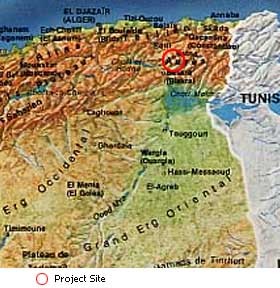|
Algeria
Most of Algeria's endangered and threatened plants have medicinal properties, and there is an increasing demand for herbal remedies. Many rural communities rely almost exclusively on medicinal plants for treating illnesses, and the urban population is increasingly returning to medicinal plant remedies, as modern medicines have become more and more expensive in recent years. Herbalists are finding it increasingly difficult to satisfy the local demand for medicinal plants. In addition, there is a high-volume international trade that is posing serious threats to the native flora and to ecosystem health. Truckloads of medicinal plants are uprooted, without any controls, and shipped across the border to Niger and elsewhere. Algeria suffers from erosion, and the loss of every uprooted plant increases the threat of land degradation.
The main project sites in Algeria are in the region of the Wilaya of Batna, in the Aures, and in the Garden of ANN in Algiers. It is being implemented by the Agence Nationale pour la conservation de la Nature, in close collaboration with the Mouvement Ecologique Algérien, with Mr Tawfik Meftah as the National Coordinator. The emphasis of the Programme is on the reproduction and multiplication of medicinal plants to promote their conservation and sustainable use.

To that end, the number and types of plants in the Batna region have been identified and classified. Nurseries have been created in both sites to experiment reproducing and cultivating medicinal plants. A seed bank has been set up to conserve the genetic material of the various species. A specimen collection and environmental materials have also been produced. A training session has been organized for farmers on the techniques of inventorying, picking and multiplying medicinal plants and on their oil extraction principles.

Pilot projects are taking place in three women-run farms for relatively large-scale cultivation of medicinal plants. Each beneficiary has committed to growing medicinal plants in 800 m2 of her prime arable land. The entire crop is being sold to an already identified local herbalist. This provided a launching pad for awareness raising, rural development, gender empowerment and improvement of livelihoods.
Finally a socio-economical study has taken place on the commercialisation of medicinal and aromatic plants in the Batna region.
|


